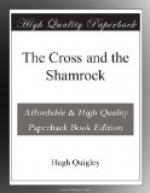CHAPTER XVII.
“HE AND HIS WHOLE HOUSE BELIEVED.”
Paul, now, though full of anxiety and care on account of his young charge, was comparatively well off. His good fortune removed him from the neighborhood of all that was low, fanatical, and cruel in New York, to the capital of Vermont. And he felt the change for the better, sensibly, in quitting the birthplace of “Millerism,” and going into a comparatively enlightened region. He thought there were, as he said, some gentlemen and ladies here in Vermont; but he could never see one of either species, properly so called, where he lately lived. The truth was, Mr. Clarke, his present employer, was a well-bred, full-blooded Yankee; and though his notions of Catholicity were such as he gleaned from the rabid discourses of half-educated preachers, and a few anti-Popery tracts which he read, his gentle and noble mind could not sanction for an instant any thing like persecution on account of religion. Hence, besides the favorable impression which the talents of Paul made on him, he considered it time to show him some kindness, to compensate for the ill treatment he underwent under the machinations of Parson Gulmore and Amanda Prying, and their clerical associates.
“Paul,” said Mr. Clarke, on Saturday night, at supper, “I am glad you are beginning to like this part of the country. I will endeavor to convince you that all America is not like your late home in York: all parsons are not like Mr. Gulmore, whose conduct in regard to your letters I cannot sufficiently condemn; nor are all young ladies of the same temper as Miss Amanda Prying.”
“I do not blame Amanda much, sir,” said the youth, fearing that he might be led to any thing bordering on detraction; “she was very kind to me in all things, except that she wanted to keep me from mass, and tried to force my sister and myself to attend Mr. Gulmore’s church.”
“That was very wrong of her, Paul. I do not think Miss Martha, here, will be so cruel as to require you to do any thing against your will; nor would she interfere with your letters to your friends, as I have no doubt Amanda has interfered. Well, Martha,” said the good-natured father, looking with pride towards his eldest daughter, a bright girl of sixteen, “are you going to force Paul with you to church; to compel him, whether he likes it or not, to eat flesh meat on days forbidden by his church? And will you forbid him to write to his uncle, who, I doubt not, is a very respectable gentleman in Ireland?”
“God forbid, father, that I should be guilty of half that. However, we shall be very glad if Paul comes to our meeting house, seeing we often go to hear the priest, Father O’C——, of the Catholic church.”
“I should be very sorry to disoblige any body, but especially one so amiable as yourself, miss,” said Paul; “but I do not think I can conscientiously go to any church except the Catholic church.”




